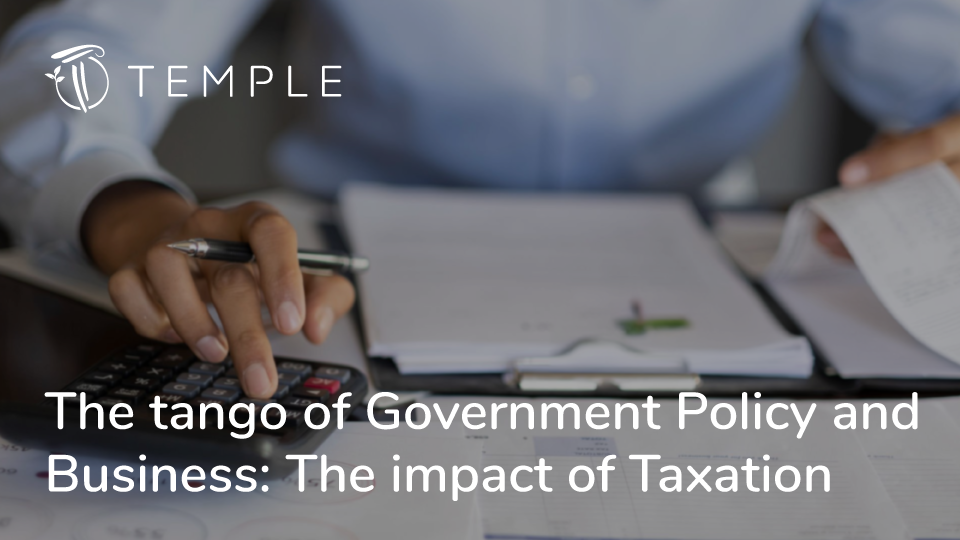Taxes can be used as a powerful tool to either hinder or help economic growth. They impact individual lives and liberty, and impact managerial decisions on businesses.
There are basically two extremes when it comes to taxation, a tax rate of 0%, where the government collects zero money and must rely heavily on voluntary donations to even exist. There is also the other extreme, whereby, the government collects 100%, controlling all aspects of economic life, with no liberty to build, innovate, create, invest in anything. All the economic decisions are naturally coerced by a central economic panel.
Happily, in the modern and globalised ecosystem, we don’t see either extreme, and as states and governments (and now the OECD) continue to set the stage of how to tax, how much or little to tax, and where to tax, there will always be business or managerial decisions that affect the economy, both at a micro and macroeconomic level. These business decisions are influenced by tax policies, such as the corporate tax rate, the tariffs on trade, capital gain taxes, government incentives, and the tax rate, which we will summarise below.
Another area of economic policy relates to interest rates. In Mauritius the level of interest rates is determined by a government appointed group – the Monetary Policy Committee. A rise in interest rates raises the costs to business of borrowing money, and also causes consumers to reduce expenditure (leading to a fall in business sales).
Government spending policy also affects business. For example, if the government spends more on schools, this will increase the income of businesses that supply schools with books, equipment etc.
Government also provides subsidies for some business activity – e.g. an employment subsidy to take on the long-term unemployed.
The Laffer Curve
Named after the economist Arthur Laffer, it shows the relationship between tax rates and the amount of tax revenue collected by governments. The curve describes the relationship between tax rates and total tax revenue, with an optimal tax rate that maximizes total government tax revenue.
The key inference from of this economic analysis is that if taxes are too high, then they will discourage the taxed activities, such as work and investment, enough to actually reduce total tax revenue. In such a case, cutting tax rates will both stimulate economic incentives and increase tax revenue.
This economic concept, first implemented in the USA, increased federal revenue from $965 billion (measured in 1996 dollars) to $1.1 trillion by 1988. The same scenario happened during the fresh tax cuts of 2001 and 2003. And most recently the Trump tax cuts saw a federal tax revenue increase hike of $14 billion (Investor’s Business Daily, 2018).
In the Mauritius context, we take an overarching view of some of the salient tax brackets, and how our rainbow nation has coped with, and in fact bucked the trend, on the world stage of taxation.
Corporate Tax
Empirically, corporations have seen a drastic drop in the corporate tax rate from among the highest in the world, to the middle of the distribution at 21 percent.
When the corporate tax rate is high, several managerial decisions will be impacted. For instance, these corporations will pass the tax onto their consumers, i.e. in the form of higher prices. Therefore, corporate taxes are a hidden tax in the form of higher cost to the goods and services. In his report The High Price That American Workers Pay for Corporate Taxes (2017), Adam Michel says, “because the U.S. has a relatively open economy, the tax is shifted from owners of capital to workers, the suppliers of labour”. He further explains that it is estimated 75 percent to 100 percent of the corporate tax is passed on to the common man. In other words, corporate executives make decisions based on keeping the business profitable and increasing the value of the firm, i.e. to the shareholders.
Also, high taxes do damage and hinder economic growth within the jurisdiction of the tax rate policies. For instance, for many years, multinational organizations, keep overseas headquarters, and by extension, their cash, in relatively lower tax jurisdictions to avoid being hit heavily with high taxes in their country of origin, this practice formally termed as Base Erosion and Profit Shifting (BEPS).
Mauritius has done rather well, with a linear and reasonable taxation system of 15%, providing enough sovereign income for its continued socio-economic reform, at the same time facilitating robust business confidence and growth across all sectors of its economy. It is perhaps no coincidence that the OECD’s proposal of a 15% Global Minimum Tax is in complete sync with the proven Mauritian tax policy, as this rate is deemed to be optimal for both the state coffers and private investment.
Trade & Tariffs
People trade on the basis that it improves each trading partner’s value. In other words, trade allows goods to move from those who value the goods to those who will value them even more, even without creating anything new. By this, a trade makes it possible for firms to specialize in what the business does best. This further makes it possible for businesses to achieve low costs through mass productions. In other words, the process of trade, “often leads to substantially lower per-unit costs and enormous increases in output per worker” (Gwartney, Stroup, & Lee, 2005). This makes it possible for us to consume more goods collectively than we could do as individuals. The principle of comparative advantages shows that certain countries can create and manufacture goods at a lower opportunity cost than others, countries end up specializing, thereby, innovating higher-quality goods that satisfy the global market. The entire China story, and indeed those of many developing countries cheap access to raw material and labour are basket cases for low barriers on trade tariffs.
Businesses must make decisions and sometimes critical decisions in the result of trade and tariff policies. These decisions could entail whether or not to do business where tariffs are imposed altogether or figure out a way to reduce the cost of production, etc.
Mauritius is part of SADEC, AU, COMESA, AFCFTA, not to mention the various FTAs in place, the most recent and significant being the China-Mauritius FTA, and the India-Mauritius CECPA.
Capital Gains
In addition, the capital gains tax is a tax paid on an increase in the value of an asset. Capital gains can also affect the individual, business, and managerial decisions. The Heritage Foundation ran a report and predicted that the expiration of the 2003 US capital gains tax cut that ended in 2010 discouraged investment and slowed economic growth. This policy of lowering the capital gains tax and even abolishing it can greatly affect business and managerial decisions. For instance, in the real estate industry in India, there is a transaction provision that allows the taxpayer to defer the tax consequence of the sale of a property. There are certain guidelines and criteria to meet before you can legally defer your capital gains without being taxed. Policies and regulations as such increase investment decisions and prove that lowering and even eliminating the capital gains increase business transactions that increase economic growth.
Business Incentives and Schemes
A government incentive assists businesses in the form of financial aid or reduced cost of capital. This can also be a tax benefit in the form of a tax deduction or tax break that many businesses may take advantage of and base their decisions from.
For instance, the sugar industry, though the various international accords, preferential tariffs, subsidised water and power supply, waivers on duties, etc., helped with significant export income, employment generation, distribution of wealth, and optimisation of arable land. Those parameters have now moved to thermal uses of cane, value added produces, re-industrialisation and re-commercialisation of the land resource, all equally supported by various incentives and schemes in support of these business ventures.
A host of business incentives and schemes are made available for large businesses and SMEs alike, especially useful in the light of the pandemic and its surprises and shocks.
The case for low taxes
When the governments lower its tax rates there are benefits to not only the economy but also to the people and the government. Lower taxes favour economic growth and a potential increase in tax revenue.
Overall, governments need funds to exercise its legal authority in keeping society from running amok, enforcing contracts, protecting private property, among other benefits that government enacts. However, it also benefits economic growth when taxes are kept low and, in some cases, eliminated, e.g. business taxes, capital gain taxes. Firms make decisions based on taxes and governmental policies can influence those decisions through taxation.
It is our view that Mauritius practices a linear, mature and optimised taxation policy, one that supports business development, R&D, and redeployment of investment into its economy, thus creating a larger tax base which remains fair for individuals and businesses as a whole.
Contact our dedicated team at Temple by email. Contact us on [email protected] for an insightful conversation around your needs.





